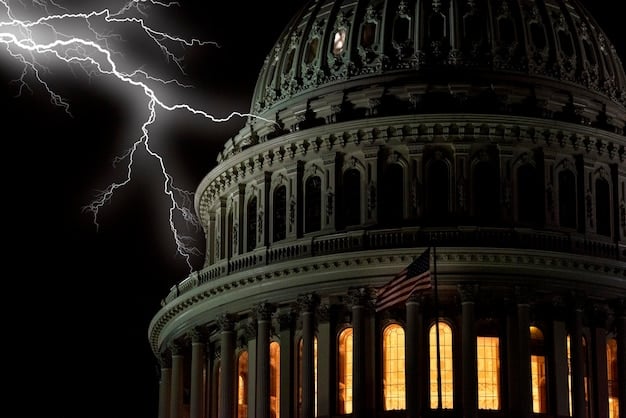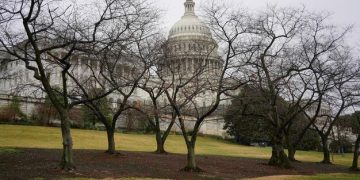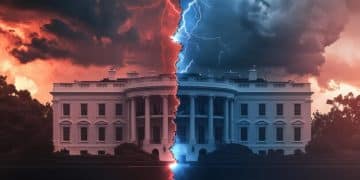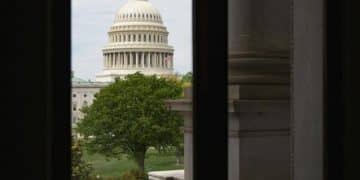Political Ramifications of Campaign Finance Violation Investigation

The ongoing investigation into campaign finance violations carries significant political ramifications, potentially impacting election outcomes, altering public trust in political institutions, and leading to legislative reforms.
The intricate world of political campaigns often involves complex financial maneuvers. But what happens when these maneuvers cross legal boundaries? The ongoing investigation into what are the potential political ramifications of the ongoing investigation into campaign finance violations? This article delves into the potential ripple effects, offering a comprehensive analysis of the political landscape.
Understanding Campaign Finance Violations and Investigations
Campaign finance violations represent breaches of laws and regulations designed to ensure transparency and fairness in political fundraising and spending. Understanding these violations is crucial to grasping the scope and potential impact of related investigations.
Common Types of Violations
Campaign finance regulations are intricate, encompassing a range of activities. Violations can take many forms. Here are a few:
- Exceeding contribution limits: Donating more than the legally permitted amount to a campaign.
- Illegal corporate or union contributions: Corporations and unions are often restricted in their ability to directly contribute to campaigns.
- Failure to disclose contributions: Hiding the sources or amounts of donations.
- Using campaign funds for personal use: Diverting campaign funds for personal expenses is against the law.
When these violations occur, investigations may be launched by government agencies or independent bodies to uncover the details and hold the responsible parties accountable.
The Investigation Process
Campaign finance investigations typically follow a structured process:
- Initial complaint or tip: An investigation often begins with a formal complaint or tip-off about potential wrongdoing.
- Preliminary review: The relevant authority reviews the initial information to determine if there is enough evidence to warrant a full investigation.
- Evidence gathering: Investigators collect evidence through interviews, document reviews, and other investigative techniques.
- Legal proceedings: If sufficient evidence of violations is found, legal proceedings may be initiated, potentially leading to fines, penalties, or even criminal charges.
The investigation process can be thorough and time-consuming, with significant potential consequences for those involved.
In summary, campaign finance violations jeopardize the integrity of elections, and investigations are critical to upholding the principles of transparency and fairness. The outcomes of these investigations can have far-reaching political and legal ramifications, as we will explore further in this article.

Potential Impacts on Elections
Campaign finance investigations have a profound effect on elections. The mere existence of an inquiry can alter voter perception and influence the outcome.
Shifting Voter Perception
When a campaign or candidate is under investigation, the negative publicity can significantly erode public trust. Voters may view the candidate as untrustworthy or corrupt, regardless of the investigation’s eventual outcome.
For example, even if a candidate is later exonerated, the initial allegations of campaign finance violations may linger in voters’ minds, affecting their decision at the ballot box. As a result, the perception of wrongdoing can be as damaging as the actual violation.
Influence on Campaign Outcomes
Campaign finance investigations can directly impact election results.
- Reduced financial support: Donors may become hesitant to contribute to a campaign under scrutiny, fearing association with potential wrongdoing.
- Distraction from key issues: The campaign may have to divert resources and attention to address the investigation, taking time away from discussing important policy issues.
- Increased opposition attacks: Opponents will likely seize on the investigation to attack the candidate’s integrity and fitness for office.
These elements can undermine a campaign’s momentum and reduce its chances of success, leading to shifts in election outcomes and potentially changing the political landscape.
In conclusion, campaign finance investigations wield significant influence on elections. Voter perceptions shift, campaign dynamics change, and election results can be impacted. These effects highlight the importance of transparency and ethical conduct in political campaigns.
Legislative and Policy Changes
Campaign finance investigations can lead to legislative and policy changes aimed at preventing future violations and strengthening the integrity of the electoral process.
Reforming Campaign Finance Laws
Following significant campaign finance scandals, lawmakers may introduce reforms to address loopholes and weaknesses exposed by the investigation. Potential reforms include:
- Increased disclosure requirements: Requiring campaigns to provide more detailed information about their donors and spending.
- Stricter contribution limits: Lowering the amount of money individuals and organizations can donate to campaigns.
- Independent oversight bodies: Establishing independent agencies with the authority to investigate and enforce campaign finance laws.
These changes can create a more level playing field and enhance transparency in political campaigns.
Strengthening Enforcement Mechanisms
In addition to legislative reforms, campaign finance investigations can prompt authorities to strengthen enforcement mechanisms. Actions might include:
- Increased funding for regulatory agencies: Providing agencies with more resources to investigate and prosecute violations.
- Enhanced investigative powers: Granting agencies expanded authority to gather evidence and interview witnesses.
- Harsher penalties for violations: Increasing the fines and potential jail time for those found guilty of violating campaign finance laws.
By strengthening enforcement mechanisms, officials aim to deter future violations and ensure that those who break the law are held accountable.
Therefore, campaign finance investigations not only reveal past wrongdoing but also serve as a catalyst for legislative and policy changes that enhance the integrity of the electoral system. By reforming campaign finance laws and strengthening enforcement mechanisms, policymakers aim to create a more transparent and equitable political landscape.

Impacts on Party Dynamics and Political Coalitions
Campaign finance investigations can have far-reaching implications for party dynamics and political coalitions. These investigations often introduce internal tensions, reshape alliances, and influence the overall strategic direction of political parties.
Internal Party Divisions
When a prominent member of a political party is implicated in campaign finance violations, it can create rifts within the party.
For instance, different factions may emerge, with some defending the accused member and others distancing themselves to protect the party’s reputation. This internal dissension can undermine party unity and effectiveness, making it difficult for the party to present a united front on important policy issues.
Reshaping Political Coalitions
Campaign finance investigations can also lead to shifts in political coalitions.
- Donors may reassess their allegiances: Supporters who previously backed the party or candidate under investigation might withdraw their financial support, seeking alternative political investments.
- Alliances may crumble: Allied organizations and interest groups may distance themselves from the party or candidate to avoid being tainted by the scandal.
- New alliances may form: Opposing parties or factions may seize the opportunity to form new alliances, capitalizing on the weakened position of the party under investigation.
These coalition shifts can have long-term consequences for the balance of power in the political landscape.
In summary, the repercussions of campaign finance investigations extend far beyond the individual accused. They trigger internal party divisions and reshape political coalitions, thereby influencing the future direction and efficacy of political parties. Understanding these dynamics is crucial for analyzing the broader political ramifications of such investigations.
Public Trust and Confidence
Public trust and confidence in political institutions are significantly affected by campaign finance investigations. These inquiries can erode citizens’ faith in their government and elected officials.
Decline in Confidence
When allegations of campaign finance violations surface, the public’s confidence in the integrity of the political system often declines. This dip in confidence can stem from:
- Perception of corruption: Violations suggest that politicians may be more interested in personal gain than in serving the public interest.
- Erosion of fairness: Illegal financial activities can create an uneven playing field, undermining the belief that elections are fair and democratic.
- Distrust in institutions: The perception that regulatory bodies and law enforcement agencies are unable to effectively police campaign finance laws.
The consequence is a public more cynical and skeptical toward their government.
Long-Term Effects
The decrease in public trust can have long-term effects on political engagement and civic participation.
- Decreased voter turnout: Disillusioned citizens may choose not to participate in elections, believing that their vote does not matter.
- Reduced civic engagement: Individuals may become less involved in community activities and political advocacy, feeling that their efforts will be ineffective.
- Increased political polarization: The erosion of trust can exacerbate divisions within society, leading to greater polarization and gridlock.
Without public trust, it becomes harder to govern effectively and address critical societal challenges.
Consequently, campaign finance investigations are pivotal in preserving public trust in political institutions. By holding wrongdoers accountable and reinforcing the values of transparency and integrity, a healthier democracy can be sustained. Nonetheless, the immediate and lasting impacts of these inquiries on voter confidence cannot be understated.
Historical Precedents and Case Studies
Examining historical precedents and case studies can offer valuable insights into the political ramifications of campaign finance investigations. Such case studies highlight the various ways these investigations have influenced elections, policy changes, and public trust.
Watergate Scandal
The Watergate scandal stands as one of the most notorious examples of campaign finance violations impacting American politics. The investigation into illegal activities by President Richard Nixon’s campaign led to his resignation and significant reforms in campaign finance laws.
The scandal resulted in stricter regulations on campaign contributions, increased disclosure requirements, and the creation of the Federal Election Commission (FEC). The Watergate scandal also had a lasting impact on public trust, creating a deep sense of skepticism toward government and elected officials.
The Keating Five Scandal
In the late 1980s, the Keating Five scandal involved five U.S. Senators accused of improperly intervening with federal regulators on behalf of Lincoln Savings and Loan Association. The investigation revealed that Charles Keating, head of Lincoln Savings, had made substantial campaign contributions to the senators.
- Political fallout: The scandal led to the resignation of one senator and damaged the reputations of the others.
- Regulatory reforms: It prompted reforms in the regulation of the savings and loan industry.
The Keating Five scandal underscored the potential for campaign contributions to influence political decisions and highlighted the importance of ethical conduct by elected officials.
Historical precedents highlight the potentially far-reaching political ramifications of campaign finance investigations. These cases emphasize the need to uphold the principles of transparency and accountability in political campaigns to maintain public trust and ensure a fair and democratic electoral process.
| Key Point | Brief Description |
|---|---|
| 🗳️ Election Impacts | Voter perception shifts, impacting campaign outcomes. |
| 🏛️ Legislative Changes | Reforms tighten campaign finance laws and enforcement. |
| 🤝 Party Dynamics | Internal divisions and coalition shifts occur. |
| 📉 Public Trust | Confidence in political institutions erodes. |
Frequently Asked Questions
▼
Campaign finance violations are breaches of the laws and regulations designed to ensure fairness and transparency in political fundraising and spending, which can include exceeding contribution limits or failing to disclose donations.
▼
These investigations can shift voter perception, erode public trust, influence campaign outcomes, and lead to reduced financial support and increased attacks from opponents, significantly impacting election results.
▼
Investigations into campaign finance often prompt lawmakers to introduce crucial reforms like stricter contribution limits, enhanced disclosure mandates, and stronger independent oversight bodies to prevent future violations.
▼
Campaign finance probes can create internal divisions, reshape political coalitions as donors and allies may withdraw support, and influence the party’s unity and strategic direction of political engagement.
▼
Public trust is essential for effective governance, because diminished trust from campaign investigations reduces voter turnout and citizen engagement, and exacerbates political divisions and polarization in society.
Conclusion
In conclusion, the political ramifications of ongoing investigations into campaign finance violations are extensive and multifaceted. They affect elections, legislative actions, party dynamics, and public trust. Understanding these impacts is essential for navigating the complex landscape of political campaigns and ensuring the integrity of the democratic process.





